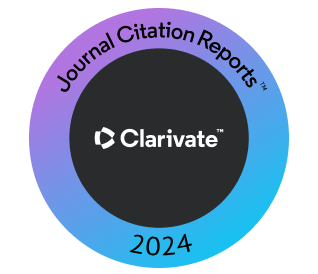Drilling Pipe Corrosion Reduction Using Natural, Biodegradable, and Environmentally Friendly Additive to the Drilling Fluid
DOI:
https://doi.org/10.14500/aro.11148Keywords:
Corrosion, Drilling fluid, Drilling pipe, pH, Prosopis farctaAbstract
Corrosion is one of the disasters attacking the drilling tools, particularly the drill pipes. Drilling fluid is the corrosive that increase the rate of corrosion in the pipes. In this study, it is intended to reduce the corrosivity of drilling fluid using a Prosopis farcta powder material. A natural, biodegradable, and environmentally friendly additive is added to the fluid in different particle sizes and amounts to obtain the lowest corrosion rate. Experiments are conducted in a well-like environment (high pressure high temperature filter press) over a wide range of parameters including pressure, temperature, and properties of the drilling fluid under dynamic conditions. The aim is to eliminate or reduce the corrosivity of the mud as well as to control the losses. The results showed a lower corrosion rate, 0.0029 mm/year, using P. farcta material in comparison with those obtained by researchers in the previous studies.
Downloads
References
Adebowale, A., and Raji, J., 2015. Local content supplements as an alternative to imported corrosion control additives for drilling mud treatment (A case study of the use of burnt plantain and banana peels. In: Proceedings of the International Academic Conference for Sub-Sahara African Transformation and Development. University of Ilorin, Kwara State, Nigeria.
Aremu, M.O., Arinkool, A.O., Salam, K.K., and Ogunmola, E.O., 2017. Potential of local pH control additives for corrosion inhibition in water base drilling fluids. Petroleum and Coal, 59(5), pp. 611-619.
Asrar, N., 2010. Corrosion Control of Drilling Tools Through Chemical Treatments-Effectiveness and Challenges. SPE International Conference on Oilfield Corrosion, Aberdeen, UK.
Azrar, J.J., and Samuel, G.R., 2007. Drilling Engineering. PennWell Corporation,Tulsa, Oklahom.
Bush, H.E., 1974. Treatment of Drilling Fluid to Combat Corrosion. Paper Presented at the Fall Meeting of the Society of Petroleum Engineers of AIME, Houston, Texas.
Chitty, H., 1998. Corrosion Issues with Underbalanced Drilling in H2S Reservoirs. Paper Presented at the SPE/ICoTA Coiled Tubing Roundtable, Houston, Texas.
Fink, J., 2015. Petroleum Engineer’s Guide to Oil Field Chemicals and Fluids. 2nd ed. Gulf Professional Publishing, Waltham.
Guo, B., and Liu, G., 2011. Applied Drilling Circulation Systems: Hydraulics, Calculations and Models. Gulf Professional Publishing, Texas.
Hossain, M.E., and Al-Majed, A.A., 2015. Fundamentals of Sustainable Drilling Engineering. John Wiley and Sons, Chichester, England.
Hossain, M.E., and Islam, M.R., 2018. Drilling Engineering Problems and Solutions: A Field Guide for Engineers and Students. John Wiley and Sons, Chichester, England.
Ismail, M., Noor, N.M., Yahaya, N., Abdullah, A., Rasol, R.M., and Rashid, A.S., 2014. Effect of pH and temperature on corrosion of steel subject to sulphate-reducing bacteria. Journal of Environmental Science and Technology, 7(4), pp. 209-217.
Jaf, P.T., Razzaq, A.A., and Ali, J.A., 2023. Effect of size and concentration of a new developed natural, biodegradable and environmentally friendly LCM on fluid losses characteristics. Iraqi Geological Journal, 56(1D) pp. 231-246.
Jaf, P.T., Razzaq, A.A., and Ali, J.A., 2023. The state-of-the-art review on the lost circulation phenomenon, its mechanisms, and the application of Nano and natural LCM in the water-based drilling fluid. Arabian Journal of Geosciences, 16(1), pp.1-31.
McDonald, M., Barr, K., Dubberley, S.R., and Wadsworth, G., 2007. Use of Silicate-Based Drilling Fluids to Mitigate Metal Corrosion. Paper Presented at the International Symposium on Oilfield Chemistry, Houston, Texas, USA.
Mohammed, K.A., Okab, A.K., Hamad, H.S., Hashim, M., and Abdulhussain, R.K., 2021. Drilling and casing pipes corrosion investigation in water based drilling mud of Iraqi oil fields environment. Journal of Mechanical Engineering Research and Developments. 44(8), pp. 232-240.
Murray, A.S., and Holman, W.E., 1967. Drilling string corrosion-a major drilling problem. Journal of Canadian Petroleum Technology, 6(02), pp. 33-36.
Okorie, M.O., 2009. Modification of drilling fluid PH with local additives: Ash of burnt palm head sponge [BPHSP] and a rich potash mineral known as Trona. Petroleum Technology Development Journal, 1, pp. 1-16.
Okoye, C.U., and Agusiegbe, C.V., 1988. Statistical Analysis of Factors That Promote Drilling Fluid Corrosion at Elevated Temperatures. Paper Presented at the SPE Formation Damage Control Symposium, Bakersfield, California.
Omidi, A., Ansari Nik, H., and Ghazaghi, M., 2013. Prosopis farcta beans increase HDL cholesterol and decrease LDL cholesterol in ostriches (Struthio camelus). Tropical Animal Health and Production, 45(2), pp. 431-434.
Patil, N., 2022. Prosopis Farcta. Available from: https://alchetron.com/prosopis-farcta [Last accessed on 2022 Mar 30].
Peretomode, E., and Peretomode, O., 2121. Temperature effects on the pH of water based drilling mud and mud ph Concerns on the environment. FUTURE Journal of Scientific and Industrial Research, 5(2), pp. 67-73.
Qasem, J.R., 2007. Chemical control of Prosopis farcta (Banks and Sol.) Macbride in the Jordan Valley. Crop Protection (Guildford, Surrey), 26(4), pp. 572-575.
Rabia, H., 2002. Well Engineering and Construction. ENTRAC Consulting Limited, London.
Watt, H., 2005. Drilling Engineering. Heriot Watt University, Institute of Petroleum Engineering, UK.
Downloads
Published
How to Cite
Issue
Section
License
Authors who choose to publish their work with Aro agree to the following terms:
-
Authors retain the copyright to their work and grant the journal the right of first publication. The work is simultaneously licensed under a Creative Commons Attribution License [CC BY-NC-SA 4.0]. This license allows others to share the work with an acknowledgement of the work's authorship and initial publication in this journal.
-
Authors have the freedom to enter into separate agreements for the non-exclusive distribution of the journal's published version of the work. This includes options such as posting it to an institutional repository or publishing it in a book, as long as proper acknowledgement is given to its initial publication in this journal.
-
Authors are encouraged to share and post their work online, including in institutional repositories or on their personal websites, both prior to and during the submission process. This practice can lead to productive exchanges and increase the visibility and citation of the published work.
By agreeing to these terms, authors acknowledge the importance of open access and the benefits it brings to the scholarly community.
Accepted 2023-05-06
Published 2023-06-01
















 ARO Journal is a scientific, peer-reviewed, periodical, and diamond OAJ that has no APC or ASC.
ARO Journal is a scientific, peer-reviewed, periodical, and diamond OAJ that has no APC or ASC.